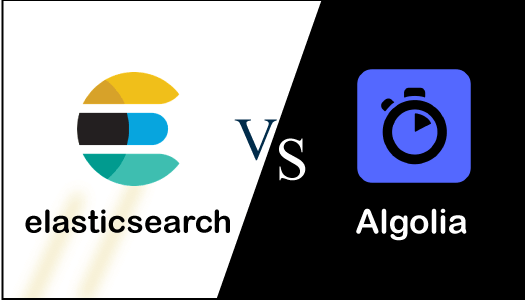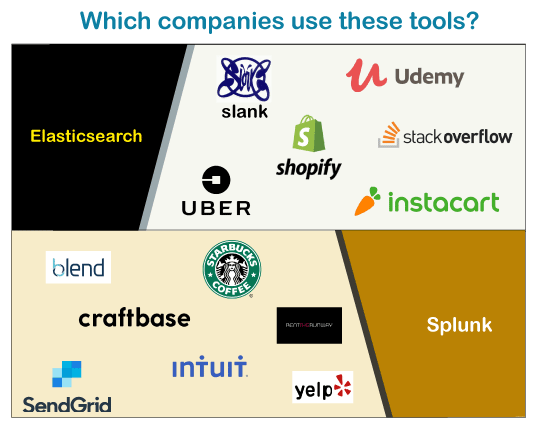Elasticsearch vs AlgoliaElasticsearch is a NoSQL database and search engine developed by Facebook in 2010. On the other hand, Algolia is a search engine developed by Nicolas and Julien in 2012. Elasticsearch is used to store the unstructured data, whereas Algolia offers search APIs to perform searches. Elasticsearch is developed in Java and designed in C++. There are several alternatives to Elasticsearch, where Algolia is one of them. Elasticsearch works well for document search out-of-the-box, but to deliver a user-friendly and fully-featured search requires additional investment. 
Elasticsearch and Algolia both are open-source, so the users don't need to pay anything to use them. They offer powerful features to their users. Although Elasticsearch and Algolia have some similarities like both are search engines and open-source products, but they also have some differences that make them different from each other. First, we will discuss briefly about Elasticsearch and Algolia separately and then their differences. Below is a list of differences of Elasticsearch and Algolia. ElasticsearchElasticsearch is an open-source NoSQL database and search engine which can be easily deployed and operated. It is used for the analytic purpose and searching your logs and data in general. As it is a NoSQL database, so it is used to store unstructured data in document format.
AlgoliaAlgolia is a hosted search engine which is completely designed in C++. It offers full-text, numerical, and faceted search and delivers the result in real-time. You can get a powerful search up in minutes. The main objective of Algolia is to make its users search experts. It allows to push your data to the API to make it searchable in real-time. Algolia enables the user for web searches via SaaS model.
Now let's move on to their differences: Difference between Elasticsearch and AlgoliaElasticsearch and Algolia both have several similarities but also have some differences. Based on some parameters, we will discuss their differences in detail. A list of differences is given below: Elasticsearch vs Algolia - SpeedSpeed is an essential feature of every tool; it makes users happy by providing a fast response in real-time. Elasticsearch works well for document search out-of-the-box, but to deliver a user-friendly and fully-featured search requires a lot of extra investment. Algolia is designed to reduce latency. In a benchmarking test, Algolia returned 200x faster result than Elasticsearch. Elasticsearch vs Algolia - CustomersElasticsearch and Algolia both are popular tools and both do the same thing that is index the data so that it is quick to search. There are several companies which use Elasticsearch and Algolia as well. Elasticsearch has several popular customers, such as Netflix, Uber, Twilio, Microsoft, Slack, Walmart, Adobe and several other popular customers of Elasticsearch. 
On the other hand, Algolia also has a number of customers, such as Amazon, Amplitude, Coursera, Intuit, BirchBox, Lacoste, Cafeyn, Slack, and several others. Elasticsearch vs Algolia - UI and dashboard visualizationMost of the time, users want to work with a graphical user interface which is easy to use and understand. Elasticsearch does not have its own GUI. You have to install Kibana for data visualization or add an extension to your browser to interact with it. These plugins provide an interactive dashboard to communicate with it. Let's see what Algolia offers to its users. For better user experience, Algolia offers front end widgets along with APIs. Algolia has a dashboard with several filters which makes it a better human-machine interface when compared to others. You can configure them to view user behavior/history or any data in a simplified manner. Elasticsearch vs Algolia - HostingAs we already discussed that Elasticsearch is a search engine which is self-hosted on a server you own. Therefore, it has the ability to set up the system exactly how you want. But it comes with the problem of security and permission, which it's a huge drawback. Although Elasticsearch also offers flexibility to its users. Now, if we talk about Algolia, it is a hosted SaaS option which themselves handles the storage of all data and hosting of the indexing system. Algolia is not a database, it is a hosted search engine accessible through an API. Elasticsearch vs Algolia - Release and costElasticsearch was released in 2010 by Shay Banon. It is an open-source tool, so the users don't need to pay any cost to use it. You can freely download and install it from its official website. For the installation step, you can follow our Elasticsearch installation chapter (https://www.javatpoint.com/download-and-install-elasticsearch#Download). Algolia was released in 2012 by Nicolas and Julien. Algolia community offers 14 days free trial along with several premium features. It is free up to 10 units for building searches. Elasticsearch vs Splunk - Integration withElasticsearch tool integrates with Logstash and Kibana to a complete ELK stack. Apart from that, it can also integrate with various other tools, such as - Datadog, Couchbase, Amazon Elasticsearch Services, and Contentful, etc.
Next TopicElasticsearch vs Cloudsearch
|
 For Videos Join Our Youtube Channel: Join Now
For Videos Join Our Youtube Channel: Join Now
Feedback
- Send your Feedback to [email protected]
Help Others, Please Share










